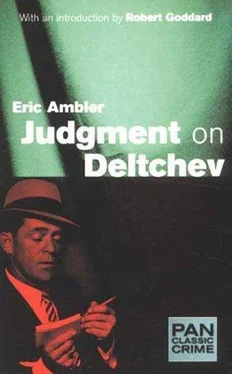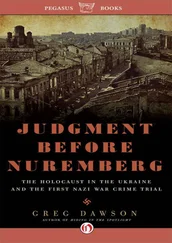Eric Ambler - Judgment on Deltchev
Здесь есть возможность читать онлайн «Eric Ambler - Judgment on Deltchev» весь текст электронной книги совершенно бесплатно (целиком полную версию без сокращений). В некоторых случаях можно слушать аудио, скачать через торрент в формате fb2 и присутствует краткое содержание. Год выпуска: 1977, ISBN: 1977, Издательство: Vintage, Жанр: Криминальный детектив, на английском языке. Описание произведения, (предисловие) а так же отзывы посетителей доступны на портале библиотеки ЛибКат.
- Название:Judgment on Deltchev
- Автор:
- Издательство:Vintage
- Жанр:
- Год:1977
- ISBN:9780307049971
- Рейтинг книги:4 / 5. Голосов: 1
-
Избранное:Добавить в избранное
- Отзывы:
-
Ваша оценка:
- 80
- 1
- 2
- 3
- 4
- 5
Judgment on Deltchev: краткое содержание, описание и аннотация
Предлагаем к чтению аннотацию, описание, краткое содержание или предисловие (зависит от того, что написал сам автор книги «Judgment on Deltchev»). Если вы не нашли необходимую информацию о книге — напишите в комментариях, мы постараемся отыскать её.
Judgment on Deltchev — читать онлайн бесплатно полную книгу (весь текст) целиком
Ниже представлен текст книги, разбитый по страницам. Система сохранения места последней прочитанной страницы, позволяет с удобством читать онлайн бесплатно книгу «Judgment on Deltchev», без необходимости каждый раз заново искать на чём Вы остановились. Поставьте закладку, и сможете в любой момент перейти на страницу, на которой закончили чтение.
Интервал:
Закладка:
The public prosecutor conducted his case in person. His name was Dr Prochaska and he was one of the few members of the legal profession who had joined the People’s Party before it had come to power. He was an authority on questions of land tenure, and most of his practice had been concerned with cases involving them. He had had little experience of court advocacy of any kind and none at all in criminal proceedings. A stout, pugnacious-looking man with quick, jerky movements and a habit of licking his lips every few seconds, he seemed more concerned to defend himself against accusations of weakness than to present his case effectively. He made scarcely any reference to the official indictment and dealt with only two of the charges in it. If he could prove, or seem to prove, those, then Deltchev would stand convicted on the whole indictment. That, at least, was the impression I had of it. From the commencement of his long opening address he adopted a tone of ranting denunciation that carried little conviction and confused even the more reasoned passages. In spite of the earphones on my head, and the voice of the interpreter quietly translating the speech, I was constantly distracted by the sight and half-heard sounds of its originator.
His case, however, was dangerously simple.
It was generally known that at the time of the German retreat in 1944 Deltchev, who had been secretly in touch with both the Russians and the Western powers, had gone to great lengths to secure Anglo-American, rather than Soviet, occupation of the country. Against the wishes of a majority of the Committee of National Unity, he had at one point gone so far as to propose to the Western Powers that the national army should continue to resist the Russians in the north so as to give the Americans and British time to prepare an airborne invasion from Middle East bases.
It was now suggested by the Prosecution that this proposal had come in fact from the Western Powers themselves and that Deltchev’s support of it had been bought with the promise that he would have control of the reallocation of the German oil concessions. In other words, he had tried to sell his countrymen’s lives for money and power.
The other favoured charge was the one that had so amused my economist friend. It was that Deltchev had planned to assassinate Vukashin, the head of the People’s Party Government, and that he was, in fact, a member of the Officer Corps Brotherhood. If this could seem to be proved, he could quite legally and with full popular approval be sentenced to death. The case against Deltchev was designed to destroy both him and the Agrarian Socialist Party which had produced him for ever.
I left the court that day in a peculiar frame of mind. I felt as if I had been to the first night of what had seemed to me a very bad play only to find that everyone else had enjoyed it immensely. A Propaganda Ministry bureau had been set up in a room adjoining the court. On the way out Pashik stopped to get the official bulletin on the day’s proceedings. The room was crowded and I waited in the doorway. There were a number of tables, each signposted with the name of one of the official languages. As I stood there, I saw a bald young man whom I thought I knew coming away from the English table. I had noticed him earlier in the day and been unable to place him. Now as he pushed his way out we came face to face. He nodded.
‘You’re Foster, aren’t you?’
‘Yes. We’ve met before.’
‘Sibley, Incorporated Press.’
‘Oh yes.’ I remembered, too, that I had not liked him.
‘What are you doing here?’ he asked. ‘Getting local colour for a new play?’
I explained. He raised his eyebrows. ‘Very nice too. Still, I expect you’ll make a play out of it sometime, won’t you?’
‘I don’t know.’
‘I should have thought that there were masses of material for you. It’d make quite a nice little paragraph, your being here. Do you mind if I use it?’
‘Yes, I do.’ I smiled as I said it, but not very cordially.
He laughed. ‘All right, I’ll spare you. But it’d be nice to send something even a little more interesting than these handouts.’ He waved the sheets in his hand. ‘I’m at our Paris office really. I’ve been lent for the trial. Why I can’t think. An office boy could file this junk for all of us.’ He turned his head as Pashik came up. ‘Hullo, Georghi, we were just talking about you.’
‘Good evening, Mr Sibley. We must be going, Mr Foster. I have to get to the office.’
‘That’s our Georghi. Always on the job!’ Sibley grinned. ‘Where are you staying, Foster?’
I told him.
‘We must have a drink together,’ he said.
In the car Pashik gave me the bulletin. I glanced through it. Most of it was composed of extracts from Dr Prochaska’s address. They were even more idiotic to read than to listen to. I put the bulletin down. The streets leading back to the centre of the city were narrow and crowded and Pashik was a driver who twitched at the wheel instead of steering with it. He squeezed his way none too skilfully between two carts.
‘Mr Foster,’ he said then, ‘there is a suggestion which I think I must make to you.’ He looked round at me soulfully. ‘You will not, I hope, be offended.’
‘Not at all. Look out.’
He twitched away from a cyclist just in time. The cyclist shouted. Pashik sounded the horn unnecessarily and put on speed.
‘It is a small thing,’ he said — the car swayed unpleasantly across some protruding tram lines — ‘but I would not, if I were in your place, be too friendly here with Mr Sibley.’
‘Oh? What’s the matter with him?’
‘It is nothing personal, you understand.’
‘But what?’
‘He drinks too much and becomes indiscreet.’
‘I don’t see that that has anything to do with me.’
‘His associates will be suspect.’
I thought for a moment. ‘Mr Pashik,’ I said then, ‘as a newspaperman don’t you think that you’re a bit too anxious about the censorship and the Propaganda Ministry and the police and all the rest of it?’
A woman missed death by an inch. He sounded the horn absently and shook his head. ‘I do not think so. It is difficult to explain.’
‘What’s so difficult about it?’
‘You are a stranger here, Mr Foster. You look on our life from the outside. You are interested in the trial of a man whose name you scarcely know because his situation seems to you to contain the elements of a spiritual conflict. Naturally so. You are a writer of fiction and you make the world in your own image. But be careful. Do not walk upon the stage yourself. You may find that the actors are not what they have seemed.’
‘Is Sibley one of the actors?’
‘I was speaking generally, Mr Foster.’
‘Then I’m sorry but I don’t understand what we’re talking about.’
He sighed. ‘I was afraid not. But perhaps it does not matter.’
I let that one go. A few moments later he pulled up outside my hotel. I got out of the car.
‘Shall we meet for dinner, Mr Foster?’
I hesitated. The air outside the car smelt good. I shook my head. ‘I think I’ll get to bed early tonight,’ I said.
CHAPTER FIVE
The Hotel Boris had been built by a German company in 1914 and was one of those hotels in which footsteps echo and only the sound of a toilet flushing in the distance reminds you that you are not alone there. The foyer was a cavernous place with a tessellated floor and a hydraulic lift in a wrought-iron cage. The reception clerk was a slow-moving, mentally deficient youth with a charming smile. He spoke a little English.
‘There is a message for you, sir,’ he said. He glanced at the scrap of paper that he had taken out of the key rack. ‘Mr Stanoiev called to see you and will call again.’
Читать дальшеИнтервал:
Закладка:
Похожие книги на «Judgment on Deltchev»
Представляем Вашему вниманию похожие книги на «Judgment on Deltchev» списком для выбора. Мы отобрали схожую по названию и смыслу литературу в надежде предоставить читателям больше вариантов отыскать новые, интересные, ещё непрочитанные произведения.
Обсуждение, отзывы о книге «Judgment on Deltchev» и просто собственные мнения читателей. Оставьте ваши комментарии, напишите, что Вы думаете о произведении, его смысле или главных героях. Укажите что конкретно понравилось, а что нет, и почему Вы так считаете.












